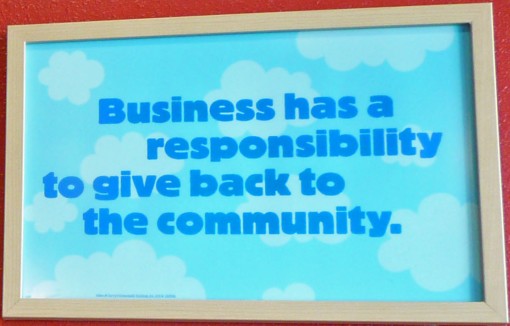A company’s track record in both social responsibility and sustainable business practices is becoming increasingly important in the employer selection process. For businesses, the question remains a sticky one: How does one strike a balance between economic growth and environmental and social stewardship? These and other issues are addressed in a course called “Corporate Social Responsibility (CSR) and Sustainability” given at Nürtingen-Geislingen University.
“The solutions to today’s problems like poverty or climate change demand the participation of the businesses,” says Professor Albrecht Müller, who teaches the course “Corporate Social Responsibility (CSR) and Sustainability” at Nürtingen-Geislingen University. The management concept known as corporate social responsibility (CSR), which focuses on social responsibility and sustainable business practices, is one way to do this.
Students from the International Management degree programme who enrol in the course explore a number of questions with their professor, such as whether companies should forego profits out of their responsibility for society and the environment. It was an important step for the university to expand its teaching of CSR to include sustainability. “It’s our way of honouring the increasingly important link between university education and sustainable development,” says Jutta Schnell, coordinator of the International Management programme.
The feedback on the seminar has been overwhelmingly positive. For DAAD scholarship holder Sergio Palazuelos, the decision to take the course was an easy one. “I’ve been interested in learning more about CSR for quite some time now I believe that every company should take on social responsibility,” says Palazuelos, who comes from Bolivia. “Luckily, people are slowly becoming increasingly aware of CSR in my own country.” He is confident that his knowledge of CSR will benefit him later in his professional life.
For future decision-making
As Professor Albrecht Müller puts it, “Many of the problems we will face in the future will not be able to be ‘fixed’ alone, i.e. on the national level. It is therefore critical for our students in the International Management Master’s programme to start thinking about these questions and begin the dialogue on potential solutions.” The seminar helped DAAD scholarship holder Norma Soria from Mexico see companies in a different light. “Until recently, I thought business was all about profit making,” she says. “I’ve now learned that every manager has to ask him or herself that one question: How do I want to make a profit and how can I contribute to the well-being of our society?”
Many of the students in the CSR and Sustainability course bring experiences with them from their home countries. Maria Alejandra Salazar from Venezuela, for instance, wants to work in an organisation that helps people. “Venezuela isn’t a very developed country and poverty is widespread. The seminar has given me ideas on how to prepare for work in this area,” she says. Salazar, who is also a DAAD scholarship holder, is now putting her coursework to practical use as an intern at the United Nations International Programme on the Elimination of Child Labour (IPEC).






